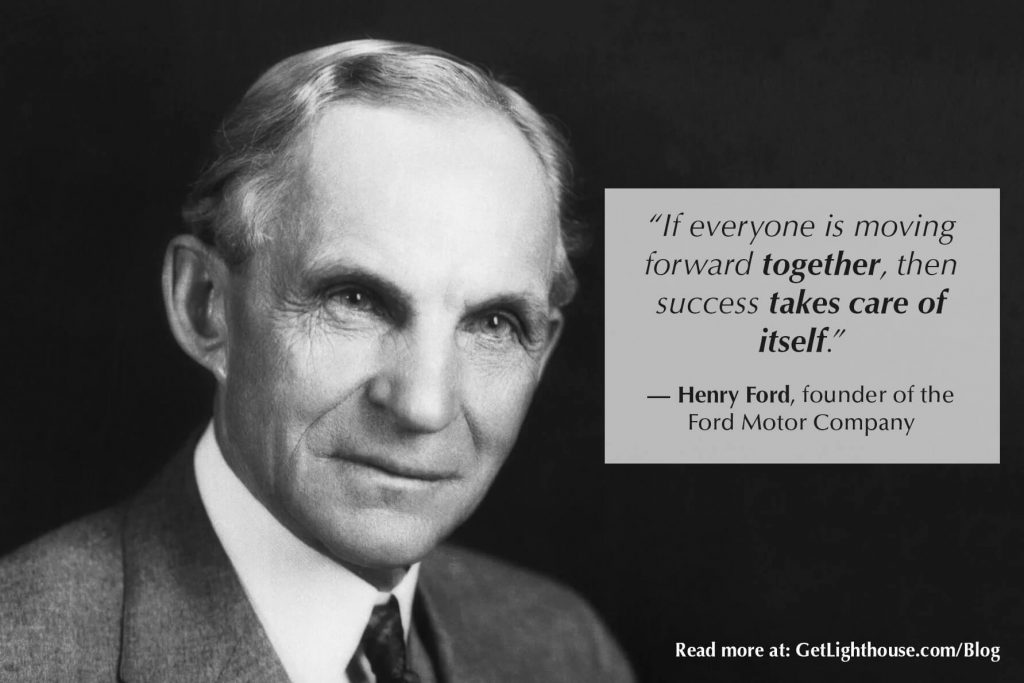“Do you know what our company’s strategy is?”
<Blank stares>
If you’ve ever gotten this response from your team, you know how damaging it can be when your team doesn’t actually understand where you’re trying to go.
It can lead to everyone trying to go in different directions, people not understanding why their work matters, and your team lacking motivation to hit your goals.
You’re in (not so) good company
It turns out, this is a very common problem. As we did research for today’s post, we found some devastating stats:
- According to research shared in the Harvard Business Review, “95% of employees don’t understand their company’s strategy.”
- And maybe that’s not surprising, because according to Organizational Synergies, “Only 27% of employees and 42% of managers have access to their company’s strategic plan.”
- Equally important, it seems even those with access are rarely looking at them as Bridges Business Consultancy reports in their 20 year study that, “Almost a quarter of organizations only review their strategy once a year.”
All of this translates to a simple truth: Most companies and teams aren’t spending enough time on their strategy, and communicating it effectively to their teams.
That’s why today we’re focusing on how you can work on your strategy with your team. We’ll be covering everything you need to both see what your team thinks your strategy is, and how to involve your team in developing new strategies that help you win.
Table of Contents for Strategy Questions You Can Ask Your Team:
- Strategic Questions to Understand the Vision and Objectives of Your Organization
- Strategic Questions on Your Market and Competition
- Strategic Questions about the Challenges Your Organization is Facing
- Strategic Questions on How Your Team Collaborates and Works Together
- Strategic Questions about Your Customers

1) Strategic Questions to Understand the Vision and Objectives of Your Organization
Does your team know your strategy? If the data we just reviewed is any indication, most likely your team doesn’t.
That’s why you should take the time to talk about your team’s vision and objectives. When your team understands them, they’re more likely to focus on the right tasks, and be more motivated to do their work, because they know why their work matters.
And a big part of ensuring your team understands a strategy is asking them about it.
These questions encourage your team members to think about their contributions in a strategic context and understand how their daily tasks fit into your bigger picture.
You can try asking these in a group meeting, or for more precise results, try asking these in your 1 on 1s; then you’ll know who on your team does and does not understand the strategy most:
- What do you think is our long-term vision or strategy at our company?
- What questions or concerns do you have about our current strategy?
- Do you feel like our current objectives align with our strategy? Why or why not?
- How do you think we’ll know if our team is contributing effectively to our strategy? What measures and signals should we use?
- How can we measure the success of our strategy? How do our milestones relate to making progress against our strategy?
- What are the potential roadblocks or challenges that could affect our progress, and how do you think we can address them?
- How can we incorporate what we know about market trends and customer needs to improve our strategy? Do you think our current strategy does this well?
- What additional resources or support do you think we need to help contribute to making our current strategy succeed?
Remember that these questions may get you surprising answers. It’s not until you ask that you find out what your team really thinks.
If you find you’re not as on the same page as you hoped, don’t get upset. Instead, recognize you have work to do to get your team on the same page and focused on the right things for your company’s strategy.

2) Strategic Questions to Ask about Your Market and Competition
No business operates in a vacuum. That means external factors greatly impact your chances of success.
Fortunately, once everyone understands your strategy, you and your team can bring your unique insights and perspective to help make the strategy even better.
This section focuses on how you can look outside your company and turn to your team to augment and improve your strategy. Because we all know a strategy is only as useful as the execution of it.
- How do you think our competitors will respond to our strategy?
- What do you think is the strategy of [our biggest competitor]? How should we respond to them based on our strategy?
- What do you think our competitors do better than us? How should that impact our strategy?
- What makes us different than our competitors? How can we take advantage of that as part of our strategy?
- What current market trends do you see that apply to our strategy? How can we use them to our advantage?
- Which current market trends are you concerned about? How could they hurt or negatively impact our strategy?
- What data or customer insights do you know that we should keep in mind as we work on our strategy?
- What data or customer insights do you think we need to go find or source to help us with our strategy? How do you think we can get it?
Many of these strategic questions could leave your team with more questions than answers, and that’s a good thing! It challenges you and your team to do the hard work to really understand your market and think about how it can apply to and improve your strategy.
This is the kind of work that can make all the difference in winning or losing in a competitive market. It can also rally your team to all help contribute to making it a success, because you’re involving them in the process.

3) Strategic Questions on the Challenges Your Organization is Facing
Every team has its challenges and issues, and no one knows them better than the people experiencing them every day.
Rather than hide from them, or ignore them completely, great leaders recognize that you have to incorporate them in your strategic plans. Otherwise, they can easily interfere with achieving your goals.
To avoid hamstringing your efforts, take the time to talk to your team about what they see as your challenges. Not only can they often clearly explain problems, but if you listen to them, they often will have valuable ideas and input that can help overcome them or adapt your strategy to account for them.
The right conversation at the right time can make all the difference in making your team more productive and more likely to help hit your strategic goals.
Here’s some of those strategic questions you can ask:
- What do you think are the biggest challenges facing our organization right now? How do you think we can best deal with them?
- What are the biggest challenges you see for our team to contribute to our company’s strategy? What blockers and issues do you see affecting us?
- How can we overcome the blockers and challenges we’ve just discussed?
- What one thing would you change to help our team move faster or get more done? Why did you choose that?
- How can we better manage our resources (time, budget, team) to tackle our most pressing issues?
- What do you think is the biggest risk to implementing the new company strategy? How could we reduce that risk?
- If we had unlimited time/money/resources, what would you do to help us hit our strategic goals? What’s stopping us from doing that now?
- What do you think our competitors (or a startup) would do if they had the same strategy we do? What prevents us from doing those things?
The key with these strategy session questions is to get your team thinking and talking.
You can see the first few are about simply getting your problems, their concerns, and challenges you face hitting your strategic goals all out in the open.
From there, you are able to start to talk about solutions and alternative options.
Then, finally, you push your team to get creative and think without your normal constraints. This is often where the boldest and most innovative ideas come from. Leave room for your team to share things that even you may think “will never work.”
You may be surprised what good ideas can come from things that sound impossible at first.
Further reading:
- None of this will work if your team doesn’t have psychological safety, trusting that they can share bold ideas and challenging questions. Learn more about how to create psychological safety on your team here.
- And if you find your team doesn’t voice a lot of feedback and concerns, learn how to get more feedback from your team here.

4) Strategic Questions about How Your Team Collaborates and Works Together
Does your team work well together? Do they collaborate, share ideas, and support each other?
Or is everyone territorial, with sharp elbows, and combative personalities?
How your team works together can be just as important to the success of your strategy as how brilliant the plan is. Effective teamwork and clear communication are the backbone of any successful team.
And while this should be self-evident, the data shows just how big a difference having a collaborative team really makes:
- According to a survey of over 1,400 employees, corporate executives, and educators, “86% of them believe ineffective communication is the underlying reason for workplace failures.”
- And that failure isn’t just a “blame game”, as a joint study by Babson College and the Institute of Corporate Productivity found that, “companies that promoted collaborative working were 5 times as likely to be high performing.”
So while communication and collaboration may seem unrelated to hitting your strategic goals, it really matters.
That’s why we have a whole set of questions for you focused solely on this:
- Do you think our team collaborates or communicates well? Why or why not? (Note: If they snicker, sigh, chortle, laugh, or eye roll, you know your answer…and have work to do!)
- When it comes to communicating and collaborating, what do we do well? Why did you choose that? (Note: Do more of this, and make sure you don’t hurt this with any changes!)
- When it comes to communicating and collaborating, what do we do we need to improve? Why did you choose that?
- How do you think we can better communicate or collaborate as a team?
- How could our team’s collaboration issues hinder achieving our strategic goals? How do you think we could overcome or address those?
- What skills do you feel you or the team are missing to achieve our goals?
- How could we address the skills gaps we have on our team to help us with our goals?
- What do you think of our current meetings as it relates to keeping us on track for our strategic goals? Which ones would you start, stop, or improve and how?
- What do you think are the best ways for us to communicate and stay connected as we work on our goals and strategic initiatives?
- What are the biggest time wasters you see across our team? How could we reduce or eliminate those to create more focus on what matters?
While some of these sections you could ask in a group setting, these questions are best asked individually in your 1 on 1s with your team members. That’s because if there are problems, or there’s a negative reaction to any of these, it’s much easier to get real candor and understand the heart of the problem in private.
Keep in mind you may not like everything you hear when asking these strategic questions. Try to keep an open mind, and don’t get defensive. The goal is listen and source ideas to get better.
If you’re not sure if you can apply an idea as presented, work with them on how you could test it or adapt it to your concerns. You may be surprised how accommodating your team members can be when they feel heard, and you’re willing to at least try something different. That’s how real innovation starts happening.
Further reading:
- Your 1 on 1s are the ideal time to talk about these sorts of issues. If you’re struggling with these meetings, or need to start them, we have you covered:
- You can learn How to start 1 on 1 meetings here
- To get a full tune up and improve your 1 on 1s no matter your situation, check out our comprehensive 1 on 1 Meeting Template Great Leaders Use

5) Strategic Questions about Your Customers
Without customers, you don’t have a business. It doesn’t matter what kind of product or service your company offers, you have customers that you need to serve, and hopefully satisfy.
Knowing this basic truth, that means that your strategy isn’t complete without taking into account how it impacts your customers.
Remembering to include this step in considering your process can really pay off:
- In a study of 10,000 consumers and 293 companies, the Temkin Group found both:
- “Net Promoter® Scores from customers who had very good customer experience averaged 24 points higher than the scores of consumers who received poor customer experience.”
- And this translates directly to your bottom line as, “a modest increase in customer experience at a typical $1 billion company can earn up to $824 million in additional revenues over three years. “
Sounds like a pretty solid impact, right?
Fortunately, your team can be a great source of customer insights…but only if you ask!
Try some of these strategic questions to keep a pulse on your customer’s needs, and learn how you and your team could improve customer satisfaction with your product/service/offering:
- What do you think we do best when it comes to serving our customers? Why did you choose that?
- What do you think we do poorly when it comes to serving our customers? How would you improve that?
- What issues do you think could come up for our customers as we try to execute our company strategy? How could we address those?
- How do you think we could improve customer satisfaction and engagement? How could that relate to our current strategic goals?
- How well do you think we understand the needs and preferences of our customers? How could we learn more quickly and apply it to our strategy?
- What changes in our customers have you noticed recently? How do you think we should adjust our approach to account for this?
- What do you think are the key pain points our customers currently experience, and how can we address them?
It’s easy to put a poster on the wall, a quote in an all hands, or words on a slide deck about how customer focused you are. Yet, none of that leads to actually caring about, nor serving, your customers.
That’s why it’s important to take time to talk to your team about your customers.
The act of asking is enough to signify to your team that it’s important. Then, these types of strategy session questions can get everyone thinking about ways to keep your customer front and center as you develop and execute on your strategy.
Are you talking about your customers enough?
Final word
You can unlock a wealth of potential insights, knowledge, and ideas from your team. All you have to do is take the time to ask them.
If you do so with a mindset of wanting to listen and learn, you may be surprised by what you hear.
The right idea can transform a team, an initiative, or a strategic goal from something that feels impossible, to making a massive, positive impact.
Next time you’re talking about your company’s strategy, make your team really feel a part of the process, and ensure they really understand the strategy by asking some of these questions.
And if asking strategic questions like these feels foreign and uncomfortable, start by learning how to become more curious, and practice being an effective listener. You can unlock a whole new world as a leader when you are both of those things.





